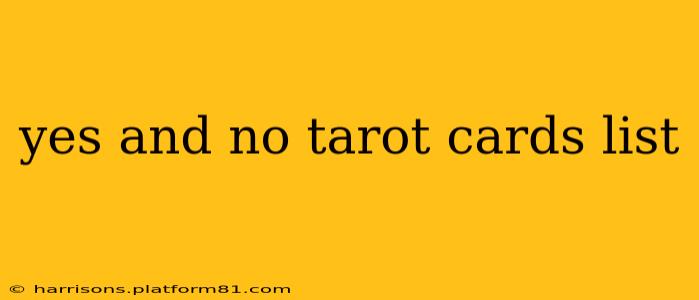The Tarot's enigmatic imagery often leaves room for interpretation, but sometimes a clear "yes" or "no" answer is needed. While the Tarot isn't designed to provide simple binaries, certain cards strongly suggest affirmation or negation. Understanding these cards can significantly enhance your readings, offering clarity and direction when facing crucial decisions. This guide explores the cards most frequently associated with "yes" and "no" answers, emphasizing nuanced interpretations rather than rigid rules.
Which Tarot Cards Mean "Yes"?
Several cards strongly indicate a positive or affirmative response. However, remember that the surrounding cards and the question's context are crucial for accurate interpretation. A "yes" card doesn't guarantee success without considering potential obstacles highlighted by other cards.
Strong "Yes" Cards:
-
The Sun: This card radiates positivity, joy, and success. It signifies clarity, accomplishment, and a generally positive outcome. A resounding "yes" brimming with optimism.
-
The World: Represents completion, achievement, and fulfillment. It suggests the successful culmination of a project or cycle, signifying a definitive "yes" to a goal nearing its end.
-
Three of Cups: This card symbolizes celebration, friendship, and joyful union. In the context of a yes/no question, it points towards a positive outcome marked by harmony and connection.
-
Ace of Wands: Represents new beginnings, creativity, and ambition. A "yes" indicating the initiation of a positive venture, full of potential and energy.
Cards Suggesting a Cautious "Yes":
-
The Lovers: While often associated with relationships, this card speaks to choices and decisions. A "yes" here, but one that requires careful consideration and balance.
-
Ten of Pentacles: Represents long-term stability and abundance. A "yes," but one that emphasizes the need for patience and sustained effort.
Which Tarot Cards Mean "No"?
Conversely, certain cards strongly suggest a negative or prohibitive answer. Again, context is key. A "no" card doesn't necessarily mean total failure but could point towards obstacles, delays, or the need for a different approach.
Strong "No" Cards:
-
The Tower: This card signifies sudden upheaval, destruction, and unexpected change, usually implying a definitive "no" to the present course of action.
-
Five of Swords: Represents defeat, conflict, and loss. A clear "no," indicating potential setbacks and the need to reconsider.
-
Three of Swords: Symbolizes heartbreak, sorrow, and emotional pain. A "no" that often relates to emotional distress or a failed relationship.
-
Ten of Swords: Represents utter defeat, suffering, and the culmination of negative experiences. A decisive "no" highlighting the need for healing and a new direction.
Cards Suggesting a Cautious "No":
-
The Hermit: Represents introspection, solitude, and the need for reflection. A "no" suggesting a delay or the need for more time and consideration before proceeding.
-
The Moon: Symbolizes illusion, deception, and hidden truths. A "no" indicating a lack of clarity or potential unforeseen complications.
What if I Get a Neutral Card?
Many cards aren't inherently "yes" or "no" cards. Their meaning depends entirely on the context of the question and the surrounding cards. Neutral cards often signify the need for more information, deeper reflection, or a different approach to the situation.
How to Interpret "Yes" and "No" Cards More Accurately?
Several factors influence a card's interpretation beyond its inherent meaning:
-
The Question Itself: A clearly defined question is crucial for accurate interpretation. Vague questions often yield ambiguous answers.
-
Surrounding Cards: The cards adjacent to a "yes" or "no" card can significantly modify its meaning, adding nuance and context.
-
Your Intuition: Trust your gut feeling. Your intuition is a valuable tool in interpreting the cards' messages.
-
Card Position: In a spread, the position of a card influences its interpretation. Different positions may represent different aspects of the question.
This guide provides a starting point for understanding the "yes" and "no" potential of certain Tarot cards. Remember that practice and intuition are crucial for accurate and nuanced interpretations. The Tarot is a tool for self-discovery and guidance, and understanding its subtle nuances will enrich your readings significantly.
